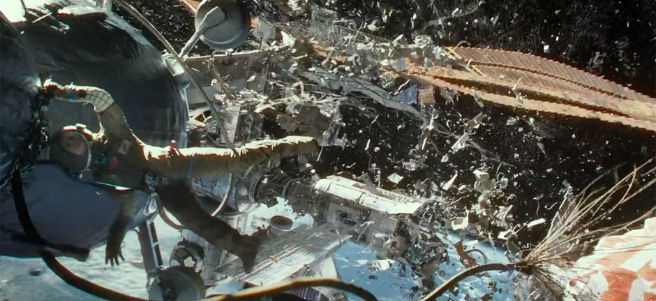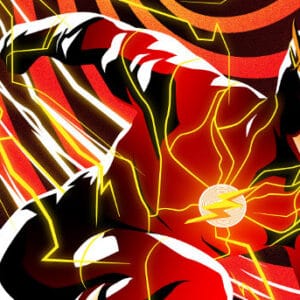Last Updated on August 3, 2021

#1 – 2001: A SPACE ODYSSEY
The grandaddy of them all, 2001 is the benchmark for realistic space travel movies. We always hear about how STAR TREK foretold technology like the iPad, cell phones, and more. Well, 2001 remains the scientifically accurate way that humans would be able to achieve long distance space flight. From the rotating ship used to create artificial gravity to Hal, the ship’s computer, 2001 is mesmerizing in every way, especially when you take into account the limits of film effects when it was made. Stanley Kubrick and Arthur C. Clarke made a movie that will eternally be looked at as the best film rooted in science fact.
#2 – MOON
Like SUNSHINE or ALIENS, MOON may not portray a real situation that can be scientifically proven, but Duncan Jones’ brilliant film takes us into what it would feel like to be isolated on the barren surface of the Moon for an extended length of time. The facility that Sam Rockwell’s character inhabits is not flashy or romantic but cold and medical in nature. This is what space travel will likely be like, as depressing as that may be. On such a modest budget ($5 million), Jones was successfully able to make viewers feel like they were alone in the universe.
#3 – APOLLO 13
Like THE RIGHT STUFF before it, APOLLO 13 is a near reverential portrayal of NASA and an iconic moment in the history of space travel. When telling a story like this, you have to be as accurate as possible. For those who witnessed the events unfold on the news, all they had were the words of Walter Cronkite and other news anchors. To see exactly what the astronauts suffered through is a harrowing experience all it’s own. Ron Howard may be criticized for many of his films, but you can never fault him for the level of accuracy he goes for.
#4 – THE RIGHT STUFF
THE RIGHT STUFF is a classy studio motion picture that follows the first manned missions into space. But, it is not just a glossy promotional movie for NASA. THE RIGHT STUFF looks at all of the ups and downs through the evolution of space travel from it’s earliest days in the 1940s and 1950s. There is a huge leap in technology from where we were to where we are now and this movie shows it to us, warts and all.
#5 – SUNSHINE
A brilliantly under-appreciated movie, Danny Boyle’s SUNSHINE knowingly allowed scientific inaccuracies for the sake of plot. But, while the anti-gravity on the ship and the entire plot device of the Sun dying may not be 100% on board with what physicist know to be true, it is the psychological drain of a long distance space voyage that SUNSHINE masters. Whether it be knowing they are journeying to their deaths or the cabin fever from a lengthy trip, the effects on all involved are what truly sells this movie.
#6 – SPACE COWBOYS
SPACE COWBOYS hit theaters 2 years after John Glenn flew in space at the age of 77. That is a fact! Clint Eastwood’s movie is a fun movie it does take the NASA model seriously. Filmed on location at NASA facilities, SPACE COWBOYS accurately portrays what it would be like for old dogs to try and cut it in the modern space program.
#7 – WALL-E
We can argue all day about whether current environmental issues on Earth will end up as dire as they appear in WALL-E, but I am not going to reference that for this list. I want to focus on the space travel component. If we doom our planet and have to leave, large ships may be the only way to make that happen. As Wall-E hangs on for dear life to reach the Axiom, we witness some beaurtiful shots of travel through the Solar System that are some of the most accurate we have seen.
#8 – MISSION TO MARS
Brian De Palma’s films released in the 2000s have mostly been hot garbage, MISSION TO MARS included, but that does not discount the impeccable scientific realism given to this story of the first manned mission to the red planet. Gary Sinise, Tim Robbins, and Don Cheadle headline the movie that wants to do for Mars what THE ABYSS did for the oceans. Sadly, the Martian face that serves as the crux for this film has since been disproven, the rest of the film does still match up with current knowledge of the planet.
#9 – CONTACT
Based on the novel written by esteemed scientist Carl Sagan, CONTACT is certainly a fictional representation of what first contact with an alien race would be like. But, the film is steeped in the actual processes and methods of agencies like NASA (even though the controversial cyanide pill scene is still disputed to this day), but the construction of the alien device and the results of Jodie Foster’s journey in the film are rooted in conceivable science.
#10 – ALIEN
Maybe not the most realistic movie in terms of plot, the design and creation of the Nostromo shows a remarkablely realistic portrayal of what space travel would look like in the future. This ship does not look like the Apple store that is J.J. Abrams’ Enterprise in STAR TREK. it is a dirty, grimy, and all around industrial vessel that shares an aesthetic with mining platforms and construction sites we see in the world today.




















Follow the JOBLO MOVIE NETWORK
Follow us on YOUTUBE
Follow ARROW IN THE HEAD
Follow AITH on YOUTUBE